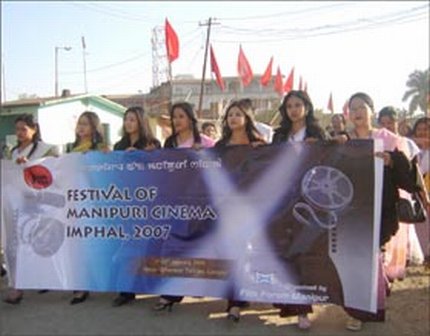Manipuri cinema: Festival and beyond
By: Angomcha Bimol Akoijam *
My decades old love affair with cinema recently had an unexpected encounter. I was invited to be a member of the Jury in the just concluded Festival of Manipuri Cinema, 2007. Despite being a part of film study circles in Delhi, and having made my debut as a film maker, initially I was not so sure of my competence for such a responsibility.
This is because I have hardly seen Manipuri cinema in its digital incarnation. In fact, I had seen till then four such films only. However, I took the opportunity for four specific reasons.
First, I wanted to see how these films mirror the preoccupations and concerns of our society. Both intellectually and existentially, it was an opportunity for me to engage with how these films codify the socio-cultural and political reality and fantasies of our people.
Second, since cinema is a cultural expression, I wanted to engage with the cultural and aesthetic forms and sensibility of our people.
Third, I took it as a platform to think about a cultural resistance and resurgence of our people through this powerful audio-visual medium. This is what the idea of a unique identity of Manipuri cinema means to me.
Fourth, beyond my predominant engagement with cinema from other parts of the globe, it was an opportunity for me to connect and initiate an intimate engagement with the films and its practitioners from my home state.

Manipuri film actors at thet start of the film fest hold a banner to announce the start of the fest
Need for Honest Reflection
The experience has been revealing. I have learned, cinematically or otherwise, a lot from the experience. But I must admit that the experience has also left me with disturbing questions. For instance, does shoddy imitation of Bollywood flicks of 1980s and early 1990s, atrocious technical blunders, mimicking 'star system' of film industries driven by millions of rupees, or attempt to copy the opulent production style (such as shooting in 'alien' locations) could provide a basis for a cultural resistance or resurgence of the people?
Do the practitioners of cinema in Manipur understand the implications of 'digital revolution' that frees creativity and cinematic enterprise from the hegemony of big money and dominant cultural forms and sensibility? Could squabbling and flexing of muscles be substitutes for a civilized and substantive effort to evolve Manipuri cinema with a unique character?
Has the festival been successful in terms of effecting what it intended to or could have done to systematize and initiate a cinematic movement for cultural and aesthetic resurgence of our people? More specifically, has the festival enabled us to register the flaws or the inherent strength of our cinema?
I hope that the practitioners and lovers of Manipuri cinema share such concerns, and take corrective measures so that we can forge a united effort to nurture a Manipuri cinema, which can be part of our national character and cultural resurgence and could claim a place for itself in the world cinema.
My Favourites
Having worked as a member of the Jury, I must take this opportunity to share my take on the films. However, I must state that these views are mine and my colleagues in the Jury may not agree with my cinematic understanding and sensibility. I saw 24 films in all during the Festival. (Watching three films a day for eight days was quite an unprecedented experience for me).
Most films are amateurish and have lots of rooms for improvement. Flatness of character and weak characterization and lack of narrative tension in the story are prominent in almost all the films.
Technically, in general the lights do not register the 'spatio-temporal' reality within which the characters are located, and the sounds do not capture the three-dimension of the represented world. Editing tends to be jarring in most cases while cinematography and composition of shots are often in variance with the motif of characters and the intentional field of the scene.
However, a noteworthy aspect of the films is the boldness in the choice of the theme and subject. It is this aspect that registers a potential to mark out a unique identity of our cinema. The talent of the actors, which remains largely unexploited, is another potential strength that we have. Some of the films, men and women behind them, and our artists make me feel optimistic.
Some of my favourite films are Basantagi Nongalamdai, Meera Memcha, Tellanga Mamei, Chang-shi-chang, Lonna Lonna, Mitrang Keithel, Kalpana, Thajabagi Wangmada, Athengabada Pharakpa Thabal, and Lakhipurgi Lakhipriyar. These films have shown aspects of good cinema.
Amongst them, the first three would stand out as the best in my choice. The directors of these films should be commended for their handling of the story, actors and the cinematic craft. Chang-shi-chang introduces some freshness in terms of genre, and also shows that we could make good film without being opulent.
Among the actors, while Raju made his presence felt in his debut film (Meera Memcha), Sadananda comes as an intense but unlucky actor who did not get a chance to perform to his potential largely due to the limits imposed by the script (Eidee Chatle). Olen's acting is often predictable and sometimes loud. But he gave measured and convincing performances in Tellenga Mamei, Change-shi-chang and Lalasi Pal.
Gokul (Sakthibi Tampha) is an actor we must look out for. If the character of Manipuri cinema were to change, the actor in him is bound to shine beyond the horizon of Manipuri cinema. But my choice from the festival is definitely Kaiku. I will remember him for his incredible performance in Basantagi Nongalamdai. His body language and display of measured emotions were in tune with the demands of the complexities of the character.
The hall mark of a stupendous performance came in full form in the scene wherein he came to know that his beloved was suffering from HIV. Maya, unlike in her other films that I saw during the festival, also gave an equally commendable performance in the same film. She essayed a difficult role almost to perfection by not giving in to the loudness of melodramatic acting.
She would give Manda who gave a life time performance in the film Lallasi Pal, a run for her money. Manda's performance in the said film is an exemplar of how one enters under the skin of the character. Indeed, Manda is not Manda but Leihao in Lalasi Pal. Binata, an immensely talented actor, did not make these two performers go unchallenged. Despite the constraints imposed on her by the script and directorial flaws, she showed her acting prowess in films such as Kaorage, Lonna Lonna and Meera Memcha.
And Seema still reminds us that she is one of our incredible performers. The maturity of a seasoned actress is what we saw in films such as Kalpana and Eidee Chatle.
While Devita (Athengbada Pharakpa Thabal, Laibaki Chandan) displayed her inherent versatility, actresses like Sonia (Tellenga Mamei) and Kamala (Sakthibi Tampha) also showed that they could give commendable performances under the right guidance of able directors.
On the technical side, there is hardly anything noteworthy to write home. However, Surjakanta's cinematography (Lakhipurgi Lakhipyari) shows that he is well ahead from the rest. If they could afford to be a little tactful, directors like Homen and Romi would go a long way in shaping Manipuri cinema.
Whether one gets an award or not, it must be emphasized that it is work, not personality that counts. For instance, it is the same person who directs an excellent film called Tellenga Mamei and a trash named Nangtana Helli. It is also the same director (Amar Raj) who crafted the first half of a film called Eidee Chatle with flashes of a master but completely destroyed the film in its latter half.
Sincerity of approach and clarity of understanding of the cinematic craft will go a long way in shaping a unique Manipuri cinema.
